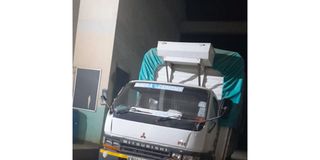Premium
Law interpretation to blame for rise in scrap metal trade

A truck which was intercepted in Loitoktok while ferrying scrap batteries to Tanzania on October 16, 2022.
Differences in the interpretation of the Scrap Metal Act have led to an increase in the scrap metal trade even as those arrested get lenient fines.
Authorities have pointed out that prosecutors are struggling in courts on the interpretation of the Scrap Metal Act, a move that leads to cases being thrown out.
The multi-agency team formed to deal with the scrap metal menace said that while police officers have intensified the war against the practice, the problem comes in when those caught are arraigned.
In the corridors of justice, prosecutors fail to convince the judges, leading to lenient fines on the offenders.
Despite the police seizing more lorries and arresting scrap metal dealers in the last few months, only one case has been prosecuted.
Last week, a driver who was charged at a Loitoktok court was fined Sh50,000 for exporting scrap batteries without a licence, a charge which carries a fine of Sh10 million or a jail term of three years.
The diver, Peter Wanjohi, also had his truck and the scrap batteries released to him, contrary to the law.
However, the Kenya Revenue Authority (KRA) has joined in the crackdown and on Sunday evening, its officers intercepted a truck ferrying scrap batteries to Tanzania in Loitoktok.
The truck, which was intercepted along the Nairobi-Mombasa highway, is being held at Issimat Police station.
A KRA officer who sought anonymity said the country has been losing raw materials to neighbouring countries through unscrupulous traders using Kenya's porous borders.
"We have declared war on these smugglers, we will follow them to the source of the scrap and have their licences cancelled," said the official.
National Environment Management Authority (Nema) Director General Mamo Mamo said the authority will also join in the fight against illegal trade.
"We have learnt that these traders are operating without a licence from Nema. We will rein on them and have the culprits prosecuted,” Mr Mamo said.
The local automobile industry is currently staring at a serious shortage of raw materials following the smuggling of scrap batteries.
Players in the industry are now calling on the government to crack down on unscrupulous traders.
In the last month, over 20 trucks exporting scrap batteries to Tanzania have been intercepted and their owners charged in court.
Last week, a truck ferrying scrap batteries was intercepted at Emali area along the Mombasa-Nairobi Highway.
The truck, according to the Eastern region Criminal Investigation Officer (CCIO) Catharine Njue, was intercepted at around 1.30 am.
“They were transporting used batteries but had also loaded metal drums which they used to disguise as the only product being ferried. However, our hawkeyed officers intercepted the lorry and arrested the driver who will be arraigned in court on Monday morning,” said Njue.
Meanwhile, another driver of a lorry which was seized along Nairobi- Mombasa Road at the Makindu area is set to appear at the Makindu Magistrate’s Court for the hearing of the case.
Daudi Sangunai denied the charge of ferrying scrap metals without a valid licence and was freed on a Sh1 million cash bail.
In the last two months, Kenya has intercepted illicit scrap batteries destined for Tanzania, three months after the state lifted a ban on scrap metal trade.
Last month, authorities intercepted a truck on Mombasa Road while ferrying scrap batteries to Tanzania. The truck was seized along the Nairobi-Mombasa Road at Kimana area in Loitoktok.
The driver, Peter Gichohi denied the charges of transporting scrap metal illegally and was freed on a Sh1 million bond and a surety of a similar amount.
Peter Wafula of the Battery Manufacturers Association is calling on the government to collaborate with Tanzanian authorities to end the illicit trade.
“The situation is getting serious and if not controlled, local manufacturers will have to close or scale down operations due to lack of raw materials,” said Wafula.
In May, the government issued strict regulations that require licensed scrap metal dealers to transport their cargo between the prescribed 6.30 am and 6.30 pm.
With the new regulations in place, the state lifted a January 20, 2022 ban that retired President Uhuru Kenyatta imposed on scrap metal business following a surge in vandalism of critical national assets including power transformers.
The new rules impose a Sh10 million fine or a three-year jail term to anyone found operating without a licence. Repeat offenders are liable to a fine not exceeding Sh20 million or imprisonment for not more than five years. Under the new rules, the export of scrap metal remains restricted.
Ms Njue said that a multi-agency team led by her officers will intensify the crackdown on the smugglers.
“We will deal with the unscrupulous traders, especially along the Nairobi- Mombasa Road,” said Njue.
The multi-agency team comprises officers from Nema and KRA among others.




